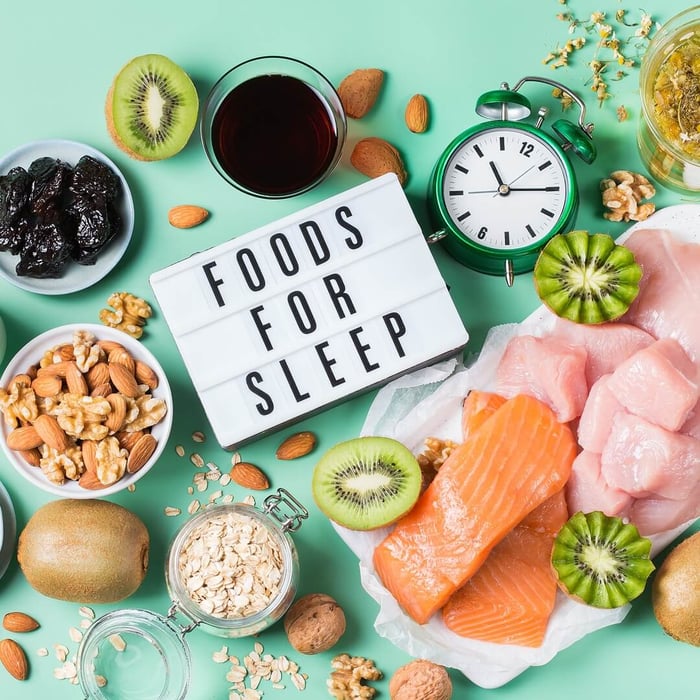Table of Contents
- Foods To Help You Sleep
- The Connection Between Regenerative Food and Sleep Quality
- 🥦 Diet and Sleep: How Diet Affects Sleep Quality
- The Science of Sleep & Nutrition
- Key Nutrients That Promote Better Sleep
- 🍒 Sleep-Promoting Foods That Work Naturally
- Eat regenerative foods for better sleep
- 1. Nutrient-dense foods for Deeper Sleep
- 2. Pesticide-Free Foods To Help You Sleep
- 3. Soil Health & Sleep Quality Connection
- 4. The Gut-Brain-Sleep Axis
- 5. Sustainable Agriculture Reduces Sleep Disruptors
- 6. Blood Sugar Stability and Sleep
- 7. The Role of Hydration in Sleep
- 8. Herbal and Plant-Based Sleep Aids
- 🥕 Sleep Foods: The Power of Plants
- Regenerative Diet for Sleep: What to Eat
- Make the Shift Today
- FAQs on Wool Duvet Inserts, Comforters & Sustainable Bedding
Foods To Help You Sleep
Struggling to drift off at night? You’re not alone. And while your evening routine plays a big role, the real magic often starts earlier—on your plate. Certain foods to help you sleep can naturally calm your nervous system, balance hormones, and set your body up for deeper rest.
But there’s another layer to this story: where your food comes from matters too. Regeneratively grown fruits, whole grains, herbs, and proteins are typically richer in nutrients, lower in chemicals, and grown in healthier soils—conditions that support the very compounds your body uses to relax and restore. In other words, better soil can literally mean better sleep.
In this guide, we’ll explore 10 sleep-supporting foods and how choosing regeneratively grown options can amplify their benefits. Eat well, sleep well, and live a little more in rhythm with nature.
The Connection Between Regenerative Food and Sleep Quality
The truth is that deep, restorative sleep starts with the food you eat. Regenerative food for better sleep provides the essential nutrients your body needs to regulate hormones, stabilize blood sugar, and promote relaxation. But industrial farming has stripped much of our food of these vital nutrients, leaving us with incredible produce but lacking the deep nourishment our bodies crave.
Regenerative agriculture and sleep quality are deeply connected. It’s not just about growing food; it’s about restoring the land, revitalizing nutrition, and, ultimately, resetting our bodies to their natural rhythms. That's why it might help to regenerative food for better sleep.
Imagine waking up feeling truly refreshed—because your diet, and the soil that feeds it, are working with your body instead of against it.Stick with me, and by the end of this, you’ll have practical, science-backed strategies to eat your way to better sleep with regenerative food—without giving up delicious meals or joy in food.
Organic Wool Comforter | Made in New Zealand, Breathable All-Season Comfort

$342.00
$380.00
Sleep naturally better with our organic wool comforter Unlike down or synthetic comforters that trap heat, our spun wool design wicks away moisture and prevents overheating, so you stay cool & dry. Designed for deeper sleep with a gentle weight… Read more
🥦 Diet and Sleep: How Diet Affects Sleep Quality
Your sleep begins long before your head hits the pillow — it starts on your plate. Diets rich in fiber, fruits, vegetables, and anti-inflammatory nutrients are consistently linked to better sleep quality. Whole, plant-based foods help regulate blood sugar and reduce inflammation, creating the internal balance your body needs to slip into deep, restorative rest.
In contrast, ultra-processed foods and late-night sugar spikes can disrupt your circadian rhythm and keep your mind wired when it should be winding down.
The Science of Sleep & Nutrition
Sleep isn’t just about counting sheep—it’s a complex biological process fueled by nutrient-dense foods for sleep. The right foods help regulate melatonin, stabilize blood sugar, and calm inflammation, setting the stage for blissful, uninterrupted rest.
Key Nutrients That Promote Better Sleep
A guide to foods to help you sleep:
- Magnesium – Nature’s chill pill. Found in nuts, seeds, and leafy greens, magnesium helps calm the nervous system and improve sleep quality.
- Tryptophan is the reason Thanksgiving dinner makes you sleepy. It is present in dairy, turkey, and seeds and helps produce serotonin, which supports relaxation and sleep.
- Omega-3s – The superhero of fats, omega-3s (found in pasture-raised and wild-caught sources) help regulate your sleep-wake cycle.
- Fiber – Good for your gut and your dreams. Fiber is found in whole grains, legumes, and veggies and promotes gut health, directly impacting sleep quality.
- Antioxidants—Berries, dark chocolate, and leafy greens contain antioxidants that combat oxidative stress, which can interfere with restful sleep.
- Calcium – Essential for melatonin production, calcium-rich foods like dairy, almonds, and leafy greens support better sleep through diet.
- Vitamin B6—Found in bananas, chickpeas, and salmon, vitamin B6 helps convert tryptophan into serotonin, a key sleep-regulating neurotransmitter.
- Zinc – Found in shellfish, meat, and legumes, zinc helps regulate sleep patterns and contributes to overall brain function.
- Vitamin D – Low vitamin D levels have been linked to poor sleep quality. Found in fatty fish, egg yolks, and exposure to sunlight, it plays a critical role in regulating the sleep-wake cycle.
A diet packed with these organic foods for better sleep isn’t just good for rest—it’s also good for your mood, metabolism, and energy levels. And if you're wondering where to find the best sources, stay tuned—we’ll break that down next.
 Regenerative living starts with simple choices — from the food that nourishes your body to the natural bedding that restores your sleep.
Regenerative living starts with simple choices — from the food that nourishes your body to the natural bedding that restores your sleep.🍒 Sleep-Promoting Foods That Work Naturally
Certain sleep-promoting foods go beyond comfort — they biochemically help your body relax. For foods to help you sleep, think tart cherries, milk, nuts, and whole grains. The best foods for sleep contain natural compounds like melatonin, tryptophan, and magnesium, which support the production of serotonin and calm your nervous system before bed. A warm cup of milk or a handful of almonds in the evening isn’t an old-wives’ tale; it’s a scientifically backed ritual that helps your body prepare for rest.
Eat regenerative foods for better sleep
1. Nutrient-dense foods for Deeper Sleep
Healthy soil = healthier food = better sleep. Regenerative farming and sleep go hand in hand—restoring key minerals to the soil makes food richer in sleep-supporting nutrients like magnesium and zinc.
Translation: you get better nourishment, and your body thanks you with deeper rest.2. Pesticide-Free Foods To Help You Sleep
Ever wondered why you feel wired at night? Pesticides and synthetic chemicals disrupt hormone balance and can mess with melatonin production. Pesticide-free foods for better sleep help restore balance, allowing for naturally restful nights.
3. Soil Health & Sleep Quality Connection
Industrial farming has left our soil (and, in turn, our food) nutrient-poor. Regenerative food and sleep health go hand in hand—better soil means better nutrients, ensuring our food supports our body’s natural rhythms.
4. The Gut-Brain-Sleep Axis
Your gut and your brain are in constant communication. When your gut microbiome is healthy, serotonin levels are optimized, leading to better sleep. Regenerative food for better sleep naturally supports gut health, improving sleep cycles.
5. Sustainable Agriculture Reduces Sleep Disruptors
Conventional farming relies heavily on chemicals, antibiotics, and artificial enhancers that may contribute to sleep disorders. Regenerative agriculture and sleep improvement mean avoiding these disruptions and giving your body the clean fuel for restful sleep.
6. Blood Sugar Stability and Sleep
Blood sugar spikes and crashes can lead to restless nights. Highly processed foods and refined sugars disrupt insulin levels, making it harder to stay asleep. Regenerative organic foods for sleep help stabilize blood sugar, ensuring steady energy throughout the day and restful sleep at night.
7. The Role of Hydration in Sleep
Dehydration can cause leg cramps, dry mouth, and discomfort that disrupt sleep. Regenerative fruits and vegetables for sleep contain higher water content and fewer contaminants, supporting better hydration and restful nights.
8. Herbal and Plant-Based Sleep Aids
Certain herbs and plants have been used for centuries to improve sleep quality. Chamomile, valerian root, and passionflower help reduce stress and promote relaxation. These plants thrive in regenerative farming environments, free from chemical interference.
🥕 Sleep Foods: The Power of Plants
If you needed one more reason to load up on fruits and vegetables, here it is — studies show that increasing your daily intake can improve sleep quality by up to 16%. The more colorful your plate, the more your body benefits from vitamins, antioxidants, and natural fiber that support hormonal balance and steady energy. Choosing organic and regenerative produce adds an extra layer of benefit, nourishing your body while also caring for the planet that sustains it.
Regenerative Diet for Sleep: What to Eat
If your sleep could talk, it would beg you to eat better. Choosing organic foods for sleep health makes a difference.
Regenerative foods to help you sleep
- Pasture-raised dairy – A natural source of tryptophan to help you relax.
- Nuts & seeds – Packed with magnesium to ease muscle tension.
- Wild-caught fish – Loaded with omega-3s to keep your circadian rhythm on track.
- Dark leafy greens – Because your gut and sleep cycle are besties.
- Berries & dark chocolate – Rich in antioxidants that reduce stress and promote relaxation.
- Whole grains – Provide complex carbohydrates that stabilize blood sugar and prevent nighttime wake-ups.
- Herbal teas – Chamomile, valerian root, and lemon balm teas support relaxation and ease stress.
The Future of Regenerative Food and Sleep Health
Let’s face it: how we farm and eat has been messing with our health for too long. But regenerative foods to help you sleep offers a path forward: it restores nutrient-rich food, balances our sleep-wake cycles, and supports overall well-being.
We nourish ourselves and contribute to a healthier planet by making conscious food choices. And honestly, who doesn’t want better sleep, regenerative food, and a better world?
Make the Shift Today
Tired of feeling tired? It’s time to change the way you eat. Prioritize regenerative, organic foods for better sleep and long-term well-being. Your body (and the planet) will thank you.So go ahead, take that first bite toward foods to help you sleep. Just maybe not right before bed—we’re not trying to give you heartburn.
Learn More About Our Regenerative Bedding
FAQs on Wool Duvet Inserts, Comforters & Sustainable Bedding
What are the best foods for better sleep?
Some of the best foods for better sleep include tart cherries, almonds, walnuts, milk, and whole grains. These foods contain nutrients like melatonin, tryptophan, and magnesium — all known to promote deeper, more restorative rest.
How does diet affect sleep quality?
Your diet and sleep are closely linked. Diets rich in fiber, fruits, and vegetables — especially anti-inflammatory foods — help regulate hormones and reduce nighttime wakefulness, leading to steadier circadian rhythms and improved sleep quality.
Are there foods that can make sleep worse?
Yes. Ultra-processed foods, caffeine, and sugar-laden snacks can disrupt your sleep cycle by spiking blood sugar and increasing inflammation. Swapping these for sleep-promoting foods like nuts, leafy greens, and complex carbs supports natural rest.
Can eating more fruits and vegetables really improve sleep?
Absolutely. Studies show that increasing your daily fruit and vegetable intake can improve sleep quality by up to 16%. The fiber, antioxidants, and vitamins found in plant-based foods support relaxation and balanced energy levels.
What’s a regenerative approach to eating for sleep?
A regenerative diet focuses on nutrient-dense, organically grown foods that restore soil health while nourishing your body. By choosing regenerative fruits, vegetables, and whole grains, you’re supporting both better sleep and a healthier planet.
What foods help you sleep better naturally?
Foods rich in magnesium, tryptophan, melatonin, and calming antioxidants—like kiwi, tart cherries, oats, almonds, chamomile, and fatty fish—can naturally support deeper sleep. These nutrients help regulate relaxation, hormones, and circadian rhythm.
How does regenerative food improve sleep?
Regeneratively grown foods typically come from healthier, more nutrient-dense soil. Better soil health creates crops with higher levels of minerals, antioxidants, and amino acids that support sleep. More nutrients → better body regulation → better sleep.
Is there a difference between organic and regenerative when it comes to sleep-supporting foods?
Yes. Organic focuses on what’s not used (pesticides, synthetic fertilizers). Regenerative focuses on restoring soil and ecosystems. Because regenerative farming rebuilds soil biology, foods often contain more sleep-supportive nutrients like magnesium and B vitamins.
Are herbal teas good for sleep?
Absolutely. Chamomile, lavender, lemon balm, and passionflower teas all contain natural compounds that calm the nervous system. Choosing regenerative or naturally grown herbs means fewer chemicals and more potent plant compounds.




